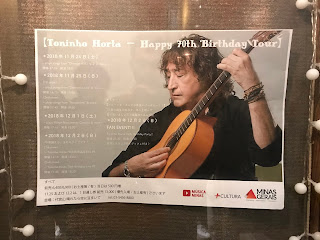Toninho Horta at Mameromantic, December 2nd 2018
This show was on a special night. December 2nd 2018 was the 70th birthday of Toninho Horta. The legendary guitar player from Minas Gerais started his career in the late sixties and and in the early seventies became part of the Clube da Esquina group along with Beto Guedes, Flavio Venturini, Wagner Tiso, Lo Borges and Milton Nascimento. The last two responsible for the emblematic album that bears that title, quite possibly the most renowned Brazilian album in history.
Toninho walked onto the stage humming the Happy Birthday tune as a reminder of the auspicious date. It didn’t take long for the audience to join him and to welcome him to what was definitely a memorable show.
Things got started with a long tuning session that involved some audience participation, setting the tone for a recurrent aspect of the show. Horta’s interaction with the crowd is more like a dialogue. In his stage banter he spoke about his gratitude to Japan, a country he considers as his second one. He contextualized the songs in the first half of the show as well, telling stories about some of the artists that have performed them. But what I meant about being a dialogue was that audience response was a big part of it. There was a recurrent bit about his water drinking speed and also about his favorite Japanese words that fed from the crowd’s reaction.
As well as the music. I was surprised to see most people in the audience singing the lyrics to Aqui Oh! in Portuguese and in tune. That tribute to Minas Gerais followed the set opener Meu Canario Vizinho Azul, from the album he did in collaboration with Beto Guedes, Danilo Cayman and Novelli, and the second song on the set: Litoral, from Joyce’s first album. Toninho Horta commanded the stage armed with an acoustic guitar and two other electric ones in the background.
A guest joined him later on, a guy that goes by Matsumonica. A truly soulful harmonica player, one of the bests I’ve seen. He was able to match Horta’s musicianship stretching those melody lines and riffing all over his instrument range. I’m not sure, but i think it was Petra da Lua the one tune where both musicians were going back and forth displaying their abilities, improvising over that terrific melody line.
Toninho then switched to electric bringing things up a notch. He played the song Viver de Amor, from Terra dos Passaros. The complex melody with its huge intervals was dissected by Horta almost note by note. He asked the audience to join him in repeating the melody back to him, people tried but it was not an easy task. Nonetheless it was a fun and engaging moment of the show that made non-musicians, like myself, realize the harmonic complexities of this music.
He then closed his solo set with a couple of tunes from an unreleased project he described as dedicated to Japan. The second of the two songs was called Shinkansen and in its lyrics it names the main cities in the route from Tokyo to Fukuoka, including Hakata, of course, Toninho’s favorite word in Japanese.
Matsumonica came back, along with two other guests: Kepel Kimura on zabumba, a type of Brazilian bass drum, and Kumi Hara on vocals. They first played Cravo e Canela from the Clube da Esquina album. As it happened with most songs in the second half of the show, instead of sang with lyrics, melody lines were vocalized. It seems to me like Toninho Horta listens to an infinite number of possible arrangements in his head and tries to reproduce them -as much as possible- with the help of the audience. The Brazilian beat box motive, along with several harmonies were demanded from the audience, in a finale that became a collaboration between the audience and the artists on stage.
By the time Aquelas Coisas Todas was performed the show had developed into an almost free form improvisation set with the melodies as an anchor and the full participation of not only the people on stage but of the audience as well. That concert closer worked also as a reminder of the sophistication and complexities behind what it seems to be effortless beauty. As we all sang different possible arrangements guided by the man himself, I thought we were lucky for witnessing someone who’s part of the lineage that includes Jobim or Nascimento. For his 70th birthday Toninho Horta delivered a memorable show.
Thank you for reading. Please follow me on Twitter at @ConcertTokyo. You can also click the Like button and get notifications at The Tokyo Concert Experience on Facebook.





Comments
Post a Comment